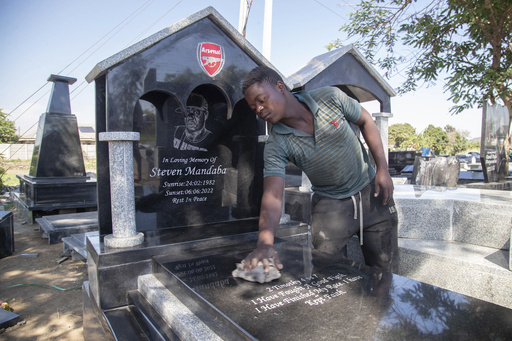
HARARE, Zimbabwe — Chipo Benhure began saving well in advance for a meaningful holiday season in her home country, but this time, the purpose was not for festive celebrations or vacations. Instead, she was preparing for a significant ceremony to unveil her mother’s tombstone, a custom deeply rooted in local culture. As Zimbabweans navigate a faltering economy, honoring the deceased during long holidays, particularly at Christmas, has become increasingly challenging yet crucial.
“I wanted to ensure I was prepared as the holiday approached, so I saved a little each month,” Benhure shared while observing the bustling scene in a crowded area on the outskirts of Harare. Stonemasons were busy at work, using grinders and polishers to craft tombstones, while others were carefully chiseling likenesses of the deceased from photographs provided by family members.
Benhure’s preparations culminated in a $450 black granite tombstone, now accompanied by flower bouquets and groceries as she and around a dozen relatives squeezed into a minibus heading to their rural hometown for the commemoration. This expense is substantial, as it equals more than double the average monthly earnings for urban households in Zimbabwe, estimated at about $200.
In Zimbabwe, the festive season serves as a poignant backdrop for many, as families often hold elaborate graveyard ceremonies filled with singing, dancing, Christian prayers, and calls for ancestral spirits to bestow protection and guidance upon the living. Many believe that participating in these rituals can bring prosperity, yet delays in honoring the dead could invite misfortune.
As Zimbabweans gear up for the holiday season, urban neighborhoods have transformed into makeshift tombstone production sites, with individuals striving to make a living. Prices for tombstones vary widely, ranging from $150 to $2,500, with many opting for installment payments. Delivery trucks are readily available for hire to transport these significant memorials.
One tombstone supplier, Tafadzwa Machokoto, remarked that this is his busiest season, serving a steady stream of customers. A graduate in computer science, Machokoto now employs nearly ten people to assist with production and sales.
“Our clients take the unveiling of tombstones very seriously. They prefer investing in these ceremonies over holiday parties, as they seek blessings,” he said. Machokoto recounted the story of a businessman who ordered eleven tombstones during a difficult period for his transportation business. Following the unveiling, the businessman expressed that he had visions of his late father urging him to maintain the family cemetery. “After the ceremony, it rained, and everyone perceived that as a sign of approval from the ancestors. The businessman later gifted me a smartphone, crediting his newfound business success to the ceremony,” Machokoto recalled.
During a recent weekend, dozens of grave sites at Zororo Memorial Park, located on the outskirts of Harare, were adorned with white cloths in anticipation of unveiling ceremonies. The family of the deceased Kindness Ziwange reported spending over $2,000 on the occasion, including $900 for the tombstone. Following the ceremony, approximately fifty family members and friends indulged in a feast featuring fried potatoes, fried rice, grilled chicken, stewed beef, and vegetable salad.
“We plan to keep it modest on Christmas Day. Today was our significant family gathering; some traveled all night to be here,” noted relative Isabel Murindagomo. While opinions vary, some view this ceremony as a fundamental Indigenous rite linked to ancestral worship, while others regard it as a Christian observance to honor lost loved ones, according to Ezra Chitando, a professor at the University of Zimbabwe.
“The majority find themselves balancing between these perspectives. Some contribute financially without attending the ceremony, highlighting the intricate interweaving of faith and cultural beliefs about the deceased,” Chitando explained. Although most Zimbabweans identify as Christians, experts indicate that many integrate traditional customs into their practices.
As for Benhure, now with her mother’s tombstone firmly placed, she finds no distinction between the two belief systems. “Respecting the departed brings blessings to the living, regardless of their faith,” she concluded.
